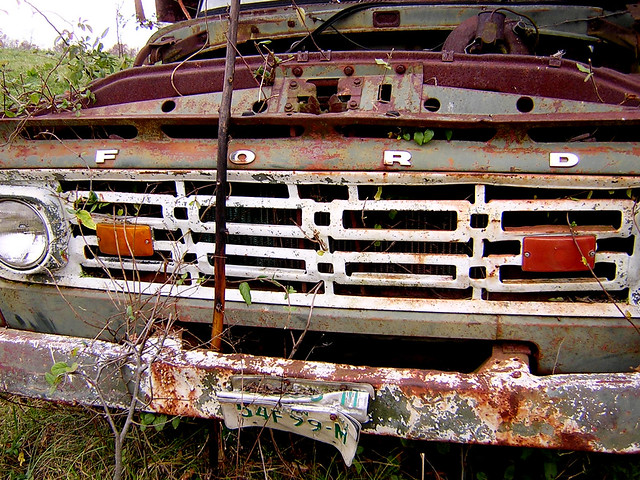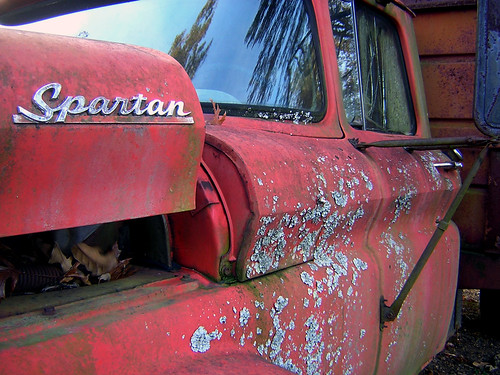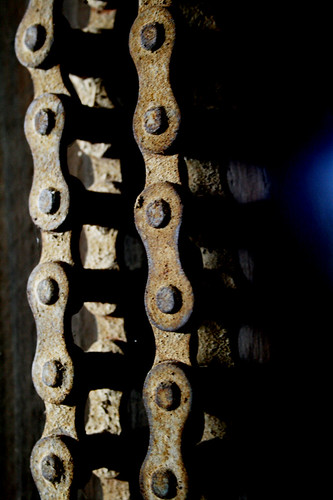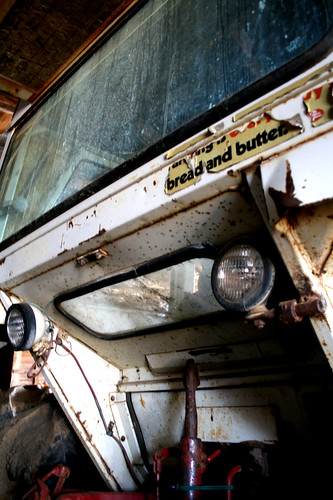Lately we’ve been watching episodes of American Pickers on Netflix streaming, and even though I enjoy the show (okay, I mostly enjoy pretending that the hosts are secretly in love with each other and that every pick each dude makes is secretly an attempt to find the perfect gift for the other dude), there’s something I find unsettling about it.
I know the whole purpose of the show is finding treasure among junk and giving things new life. It’s the same thing with the house-flipping shows. I get that. And I appreciate that. Like any red-blooded consumer of stuff, I love browsing overcrowded thrift stores and antique malls and tourist traps that are teeming with crap. And I enjoy the personalities of many of the (usually) old people the guys encounter and try to haggle with.
But the whole thing just makes me sort of sad. Every time their weird little van pulls off on yet another country road and into yet another country driveway, I see sadness and decay. I see my home and my family history. As the pickers rifle through dusty junk in dilapidated barns with corrugated metal roofs, looking for knick-knacks with old advertising logos on them, I see an entire way of life that has all but evaporated. I don’t know. It feels like watching vultures feed on the carcass of agricultural America.
I know that sounds hyperbolic (it is!). I know I am feh-ing all over good, clean, enterprising American fun, but I get so profoundly sad sometimes watching these old people be nickel and dimed out of ancient relics that they have for whatever reason hung onto throughout their entire lives. These pickers go from rusty graveyard to rusty graveyard, prying gems out of headstones and leaving a few dollar bills under a rock. Granted, a lot of these sellers are making decent money from the pickers on the show, and in turn getting good exposure to other collectors who might be watching and researching. That’s nice.
It’s a business, I get it. But it’s a macabre one.
My family lives on one of these rural American graveyards. It might be a picker’s paradise for all I know. I just know this: It wasn’t always a graveyard. Once upon a time, those rusting heaps that are scattered throughout our sheds and barns and pastures were shiny and new (but not for long), and hauled hay, cattle, pigs, chickens, horses, corn, and soybeans all over the Mid-South.
The farm has gone from functional to almost completely symbolic in my lifetime. When I was born, my dad was a farmer. That was his job. As it has been his dad’s job. I remember when Dad wore big trucker hats to keep the sun out of his eyes as he maneuvered his tractor around the hundreds of acres he was responsible for tending. He sported the finest farmer’s tan known to man. (Seriously, you need to click that link. I’ll wait.) (Glad you clicked, aren’t you?) Even my sister was expected to help out with farm duties; some of my earliest memories are of going with her to slop hogs before school. I remember seeing pigs being born and playing in the grain bins.
When I was itty bitty, Dad got a job at the local paper mill, and his time spent doing farm stuff started to fall off. Eventually almost all of the livestock was sold off and Triple T Farms wasn’t farming nearly as many acres as it had been in the past. Equipment broke down and became too costly to fix and too expensive to replace and one day suddenly everyone in the family was punching the clock away from the farm, and we were surrounded by scrap metal being overtaken by vines and dust.
I’m not trying to over-romanticize farm work. It’s hard and it’s thankless and it’s constant. It’s tied to the fickle whims of nature. But it is honest work, valuable work. Necessary work. Work that is so organic that it puts you in touch with the very nature of life itself. These days, it is rare work.
I don’t know. It’s hard to think about how a place can become a picker’s paradise without having to confront the loss and pain that got it there.
But then again, that’s anything, I suppose.






Yes, exactly. you’ve summed up exactly why I can’t watch that show. I love it, but it breaks my heart.
I’d leave Nashville in a second and go back to my family’s farm if I thought I could bring it back from that decay.